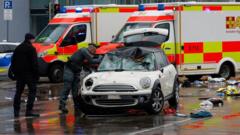The attack, attributed to a 24-year-old Afghan asylum seeker, has raised concerns about immigration and security as Germany approaches its federal elections, with political leaders emphasizing the need for policy changes.
Car-Ramming Incident in Munich Sparks Immigration and Security Debate Ahead of Federal Elections

Car-Ramming Incident in Munich Sparks Immigration and Security Debate Ahead of Federal Elections
A suspected car-ramming attack in Munich injures dozens, bringing immigration and security issues to the forefront ahead of upcoming federal elections in Germany.
At least 30 people were injured, with several in serious condition, after a car was deliberately driven into a crowd during a union rally in Munich on Thursday, just a week ahead of Germany's federal elections. The driver, identified as a 24-year-old Afghan asylum seeker by police, was arrested at the scene. Due to the suspect's alleged extremist background, counter-terrorism officers have taken over the investigation.
This shocking incident arrives amidst heightened tensions in Germany surrounding immigration and security issues, particularly in light of prior attacks allegedly involving immigrants. Chancellor Olaf Scholz condemned the driver’s actions, stating he "must be punished and he must leave the country." The car ramming occurred close to Munich's main train station during a rally organized by transport workers, prompting police to fire at the vehicle before detaining the suspect.
Witnesses described a chaotic scene with people fleeing into nearby shops as the attack unfolded, leading to feelings of distress and insecurity among residents. Munich's mayor, Dieter Reiter, reported that children were among the injured, emphasizing the seriousness of the situation. The timing of this attack is significant, as it coincides with the Munich Security Conference, which will feature notable world leaders.
The suspect, who came to Germany as a minor in 2016, previously had his asylum request rejected and was slated for deportation in late 2020, although he remained in Germany due to security concerns in Afghanistan. Officials confirmed that he had a valid residence permit at the time of the incident. The attacks have recurrently reignited discussions on immigration policy, particularly with the upcoming elections on February 23 and the growing support for the far-right Alternative for Germany (AfD) party, which is currently polling in second place.
Bavaria's Premier Markus Söder referred to the incident as a “suspected attack,” demanding immediate changes in the country's policies. Previous violent episodes, including a stabbing in Aschaffenburg linked to Afghan nationals, have intensified public discourse surrounding the perceived connection between immigration and security issues.
In light of the increasingly frequent violent incidents involving immigrant communities, political leaders are facing mounting pressure to effectively address national security and immigration policies to prevent future tragedies, with calls for increased deportations for serious offenders gaining traction among the electorate. As this story develops, eyewitnesses and local citizens are coming forward to provide information that may aid in the ongoing investigation.



















